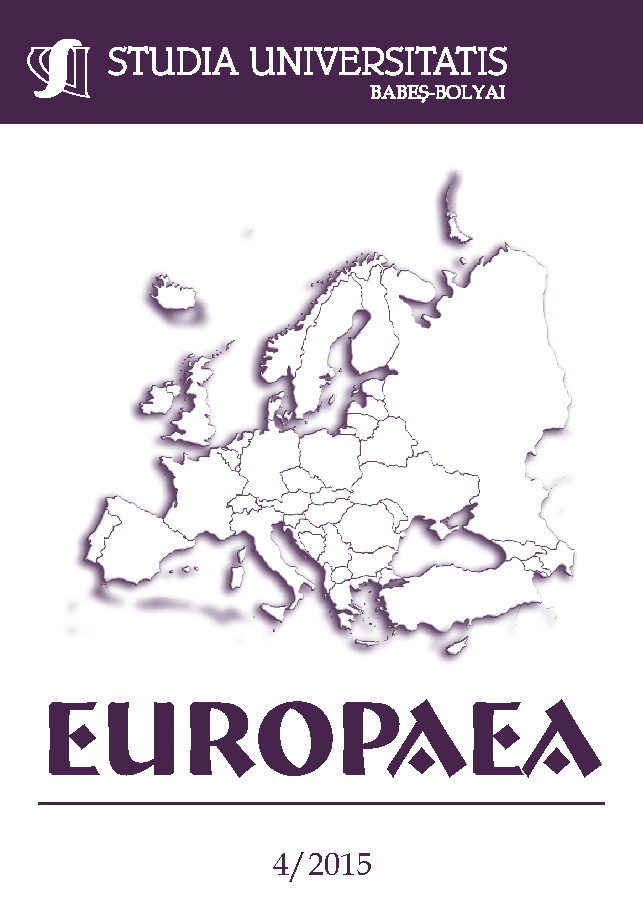THE CONCEPTUALIZATION OF IDENTITIES IN THE ORTHODOX CHURCH OF BESSARABIA. THE TRANS-ETHNICAL ORTHODOXY
Keywords:
trans-etnical orthodoxy, confesional belonging, ethtnic belonging, identity, BessarabiaAbstract
The blending of the national and the religious aspects which occurred in the regions of Central and Eastern Europe has not occurred in Bessarabia, where a transethnic orthodoxy is present (the same religious values are shared due to common religious belonging, even if the ethnicity is different). Thus, it is interesting to understand which theoretical model could explain this relationship or the relationship configuration of ethnical either confessional identity which are different or overlapped in the Orthodox Church of Bessarabia. Another question is to what extent the ethos associated to the orthodox community in Bessarabia, whose distinctive feature is the ethnic diversity, can be considered to be as a model for managing the cultural diversity, a unique model in the area of Eastern Christianity, which generally has strong ethnical connotations in different countries.
References
Cemârtan, Romeo (2004), Cazul Mitropoliei Basarabiei: interferenţe politice şi religioase, Chişinău: Editura Alfa şi Omega.
Ciobanu, Ştefan (1992), Cultura românească în Basarabia sub stăpânirea rusă, Chişinău: Editura enciclopedică “Gh. Asachi”.
Cuşco, Andrei; Şarov, Igor (2009), ”Identitate, memorie şi discurs istoric în Moldova postsovietică: o abordare critică”, in Suveică, Svetlana; Eremia, Ion et al. (eds.), Istoriografie şi politică în estul şi vestul spaţiului românesc, Chişinău/Oradea: Oradea University Press.
Frunză, Sandu (2004), ”Pluralism şi multiculturalism”, in Journal for the Study of Religions and Ideologies, no. 9, 136-143.
Huntington, Samuel P. (1997), Ciocnirea civilizaţiilor şi refacerea ordinii mondiale, Bucuresti: Editura Antet.
King, Charles (2002), Moldovenii: România, Rusia și politica culturală, Chișinău: Editura ARC.
Kymlicka, Will (2000), ”Teorie politică occidentală şi relaţii etnice în Europa de Est”, in Polis. Revista de Ştiinţe Politice, no. 2, vol. 7, 5-72.
Lobonţ, Florin (2009), ”Romanian orthodoxy, between ideology of exclusion and sécularisation amiable”, in Journal for the Study of Religions and Ideologies, no. 24, vol. 8, 46-69.
Marga, Andrei (2014), Religia în era globalizării, Bucureşti: Editura Academiei Române.
Murafa, S. (1913), ”Cine-s moldovenii? (Din Istoria neamului)”, in Cuvînt Moldovenesc, no. 1, 17-20.
Neumann, Victor (2003), Neam, popor sau naţiune? Despre identităţile politice europene, Bucureşti: Editura Curtea Veche.
Patriarhia Română (1993), Adevărul despre Mitropolia Basarabiei, Bucureşti: Editura Institutului Biblic şi de Misiune al Bisericii Ortodoxe Române.
Pelivan, Ion (1905), ”Din Istoria Nouă a Basarabiei”, in Viaţa Basarabiei, no. 255/310, apud Arhivele Basarabiei (1932), no. 2, 109-112.
Păcurariu, Mircea (1993), Istoria Bisericii Ortodoxe Române, Chişinău: Editura Ştiinţa.
Salat, Levente (2005), ”Statul-naţiune şi provocările diversităţii”, in Journal for the Study of Religions and Ideologies, no. 10, 4-11.
Săgeată, F. (1934), ”Cultura rusă în Basarabia s-a refugiat în familie”, in Viaţa Basarabiei, no. 4, 223-226.
Suttner, Ernst Christoph (2007), Staaten und Kirchen in der Völkerwelt des östlichen Europas. Entwicklungen der Neuzeit, Freiburg, Schweiz: Academic Press Fribourg.
Taylor, Charles (2002), Die Formen des Religiösen in der Gegenwart, Frankfurt am Main: Suhrkamp Verlag.
Taylor, Charles (1999), ”Politica Recunoaşterii”, in Secolul 20. Europele din Europa, no. 10-12/no. 1-3, 491-518.
Thual, François (1998), Le douaire de Byzance. Territoires et identités de l'orthodoxie, Paris: Ellipses.
Weeks, Theodor R. (2006), ”Managing empire: tsarist nationalities policy”, in Lieven, Dominic (ed.), The Cambridge History of Russia. Volume 2: Imperial Russia, 1689–1917, Cambridge: Cambridge University Press, 27-44.
Downloads
Published
How to Cite
Issue
Section
License
Copyright (c) 2015 Studia Universitatis Babeș-Bolyai Europaea

This work is licensed under a Creative Commons Attribution-NonCommercial-NoDerivatives 4.0 International License.






